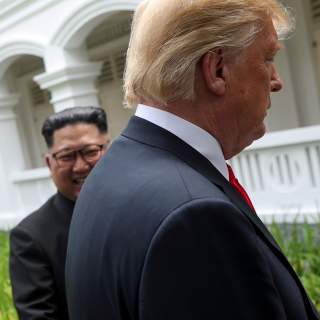North Korea and America’s Second Summit: Here’s What Wallace Gregson Thinks Will Happen
"Why would North Korea ever believe our security guarantees?"
Editor’s Note: Want more ideas on what will happen at the summit? Check out all 76 expert opinions we gathered here.
Sometime this month an embattled U.S. president will meet with North Korea’s leader Kim Jong-un. Challenges abound.
-
President Trump needs a victory. Kim needs only to maintain the initiative in the eyes of the nations in the region.
-
South Korean President Moon is under pressure to move toward the reduction of forces, partially accomplished recently in the Demilitarized Zone. Pressure exists from both north and south for early forms of economic integration with the North through rehabilitated rail lines, joint industrial areas, resumption of tourism to the North, and other measures, despite the previous allegiance to “maximum pressure” sanctions. President Moon will be receptive to Kim’s entreaties to change the Republic of Korea-U.S. relationship.
-
The U.S. president already declared at the Singapore Summit that there is no longer a nuclear threat from North Korea. As a result, if Kim does not get what he wants from this pending summit, he can reverse the putative result of the previous meeting, inflicting a public rebuke to President Trump.
-
“Denuclearization” means different things to each party. For America, it means that North Korea completes a verifiable end to their nuclear weapons program. North Korea’s definition means “complete denuclearization of the Korean Peninsula.” This is no less than the withdrawal of all nuclear-capable forces from the Korean Peninsula and from Japan, resulting in the end of U.S. Extended Deterrence in support of our allies.
-
Kim outplays all parties in the public relations fight. He emerged from the Winter Olympics with a 78 percent approval rating in South Korea. His ratings there remain exceptionally high. South Korea’s President Moon enjoys favorable ratings, but not as high as Kim. The North-South summits and direct dialogue created momentum for reconciliation on the Peninsula and for portraying America as opposed to national reconciliation and peace. It’s unlikely that President Moon will risk his approval rating to support the U.S. position without reservation.
-
The U.S. preemptively conceded to a North Korean demand by suspending joint U.S.-ROK military exercises and adopted North Korean rhetoric by describing these as “war games” and “provocative.”
-
Kim effectively demolished any “Singapore Summit Magic” by not dealing well the U.S. Secretary of State Mike Pompeo during and after Pompeo’s visit to Pyongyang. It’s clear that Kim and his officials will not deal with any officials other than the President—an astounding demand.
-
Kim said the next move is ours—to remove sanctions.
-
The massive threat to Seoul from the Kaesong Heights just to the north remains.
-
New North Korean missile sites have been discovered regularly since the last summit.
-
Relations between America and the ROK are troubled. The U.S.-ROK Special Measures Agreement talks—the instrument to determine and document cost sharing for U.S. military presence there—broke down in December and only just reportedly got resolved.
-
North Korea easily evades sanctions through their global criminal network exporting everything from narcotics through counterfeit currency to conventional weapons, missiles and weapons of mass destruction.
-
North Korea employed a Weapon of Mass Destruction with the murder of Kim Jong-nam in Kuala Lumpur Airport with VX nerve gas.
-
This was a demonstration of both skill and will.
-
It was a message to China, Kim Jong-nam’s protector, and nations of the Association of Southeast Asian Nations who host thousands of North Korean laborers, businesses, and criminal operations.
-
The most profound obstacle is the existence of the North Korean nuclear and missile programs, and their success. What can we possibly offer North Korea that is more believable, more powerful, and more enduring, than the security they have realized through these programs? We have been known to change our mind on international agreements with changes of administration. Certainly, North Korea’s leadership, over three generations, has been exceptionally perfidious about their pledges. Kim was in school in Switzerland when Muammar Gaddafi was killed in a ditch. Why would North Korea ever believe our security guarantees?
Wallace C. Gregson, a retired Marine and former assistant secretary of defense for Asian and Pacific Security Affairs (2009–11), is currently a senior advisor at Avascent International and senior director for China and the Pacific at the Center for the National Interest.
Image: Reuters


